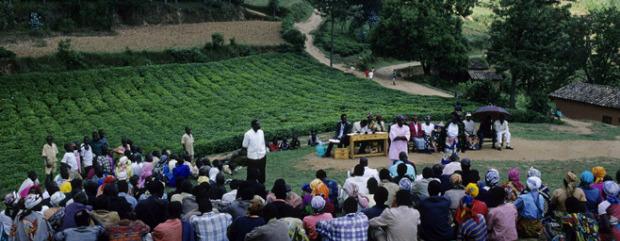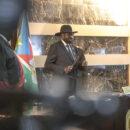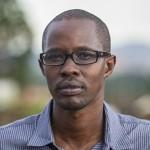Rwanda: Past Politics and Present Preservation of the Gacaca Files

Rwanda’s gacaca courts are entering a new phase of transformation, from being a controversial mechanism for providing truth and reconciliation for genocide survivors; they are becoming an important part of Rwanda’s history. At the end of the 1994 Rwanda Genocide, the new Rwanda Patriotic Front-dominated government faced the legal question of how to provide justice to genocide survivors and victims by prosecuting over 120,000 suspected genocide perpetrators. Trials through Western-style courts were seemingly impossible with estimates of as high as 100 years to prosecute all suspected genocide perpetrators. Instead, the Rwandan government attempted to use the traditional judicial system of gacaca, last used in the colonial period.
The utilization of this legal mechanism was heavily questioned by scholars such as Alison Des Forges, who believed that gacaca could not be appropriately modernized and expanded to the level required to accomplish the task of prosecuting genocide perpetrators. Human Rights Watch and Amnesty International, alongside the University of Antwerp’s Professor Dr. Fillip Reyntjens, criticized gacaca’s ability to provide proper representation and protection to suspected perpetrators. Dr. Phil Clark writes about how members within the Rwandan government, including President Paul Kagame, held sceptical views on gacaca’s possible effectiveness. Given these concerns, The Netherlands was initially the only donor nation to financially assist in the orchestration of the court system.
The gacaca courts officially closed in June 2012 amidst claims by the Rwandan government that it had been a great success that illustrated Rwanda’s reliance on home-grown solutions. Criticism of its effectiveness in providing justice did not end, however, and continues today. The story after the closing of the gacaca courts was largely ignored until recently. On December 11, 2014, came the announcement that the government-run National Commission for the Fight Against Genocide (CNLG) would be working with the British NGO, Aegis Trust, in a new joint venture to preserve and digitize the fifty million pages of records from each individual court case. In March 2015, the Rwandan government earmarked nearly GBP 730,000 for the project. This partnership is being hailed as a victory towards preserving Rwandan history. However, an important aspect of this history is not being discussed, and that is the politicization and abandonment of the files previously by its former sole administrators, CNLG.
After the closing of the gacaca courts, the physical files of each court case were kept in the Rwanda National Police Headquarters in Kigali in order to protect them from possible harm. The files’ location made it extremely difficult for the average person to gain access to them. Previously, a researcher needed to produce documentation to show how their utilization of the files would benefit Rwanda. Most would answer that by receiving access, they would use the information to publish, showcase or teach non-Rwandans about the genocide. However, since July 2014, access to the files became increasing difficult, with ever more obstacles put in place to prevent the files being seen or used by possible critics of the government.
Often, CNLG employees screened researchers to verify if they were pro- or anti- the Rwandan government. If researchers had written negatively about the government, even on subjects that had little to do with the genocide, such as the Congo Wars, they would be denied access or their use of the files heavily monitored. Bureaucratic corruption also became a mechanism to prevent or hinder access to the files, for example, by telling people they had not filled out an online application from an internet application program that was often not working, communication delays and misinforming people on how to gain access. This hindrance to gaining access was in the name of protecting the gacaca files, but the physical condition of the files meanwhile grew rapidly worse as they continued to be stored in cardboard boxes, in a complex mimicking the last scene of Indiana Jones and the Raiders of the Lost Ark. Ten to fifteen boxes were stacked on top of each other in rooms without environmental control.
The New Times Rwanda newspaper often publishes articles about international leaders visiting the police headquarters to see the state of the gacaca archives. Funds designated to assist in preserving the files through the use of simple filing cabinets and digitization seemed to always vanish. Additionally, when funding to CNLG was made available to provide the infrastructure to properly house the documents, it would often be rejected because it did not cover both preservation and digitization. International support from educational and NGO institutions were often ignored in the hope of following the “˜Agaciro’ ideology of self-reliance.
Aegis Trust has now entered the scene as a glimmer of hope for preserving, digitizing and accessing the gacaca files. Many of the architects of Aegis’s involvement are well aware of the problems of the current state of the archives. One undisclosed person informed me that they wanted the NGO, which operates the Kigali Genocide Memorial, to participate in order to save a very important part of Rwandan history. This good intention was met with cynicism, since CNLG saw this as an assault on their prestige of being the “˜care-givers of the gacaca archive’. During the ceremony introducing the joint venture, the Minister of Youth and Culture and the Executive Secretary of CNLG walked out, leaving only the Director General of its Research and Documentation Center on Genocide (a mid-level bureaucratic position) in attendance, in order to minimize Aegis’s role.
Aegis has prepared itself for the probability that CNLG will try to stall the three-phase five-and-a-half year project to re-house the files in the (still under-construction) new building at the Kigali Genocide Memorial and have it digitized for more widespread access. Unlike CNLG, Aegis has created international partnerships with the Institute for War, Holocaust and Genocide Studies (Netherlands), King’s College London and the USC Shoah Foundation to assist in preserving the gacaca files. Most importantly, Aegis is trying to prevent politics from influencing access to the new archives. Focus and credit are being given to CNLG for recent progress in preserving the gacaca files, but it is Aegis that is working feverishly in the background to gather together international partners to preserve the files for researchers and the world to better understand the controversial mechanism of gacaca as a form of transitional justice and reconciliation.
The author has asked to remain anonymous.







